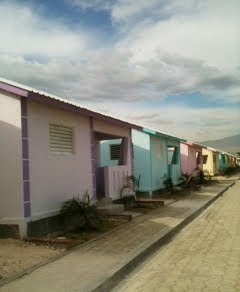 “The people who will live in these homes are among the poorest of the displaced people directly affected by the earthquake, and living in tents and other makeshift shelters around the city,” said Alvaro Pereira, Executive Vice President of Food For The Poor. “This development is not only providing the dignity and safety of homes, but also offering hope through jobs. Local residents have found jobs building the homes, and with those skills they are able to go find other work.”
“The people who will live in these homes are among the poorest of the displaced people directly affected by the earthquake, and living in tents and other makeshift shelters around the city,” said Alvaro Pereira, Executive Vice President of Food For The Poor. “This development is not only providing the dignity and safety of homes, but also offering hope through jobs. Local residents have found jobs building the homes, and with those skills they are able to go find other work.” More than 2,700 two-room homes have been built by Food For The Poor in Haiti since the January 2010 earthquake. While 1.3 million people were initially left homeless by the earthquake, about 500,000 are still without shelter, according to the United Nations’ shelter committee. Moving the people out of the makeshift tents pitched in the city’s parks, plazas and public places is a challenge because most have no place to go. Through the charity’s housing initiative, about 13,500 people have a safe place to live.
The Inter-American Development Bank funded the site development in Orangers and a portion of the cost of every home, while the balance is being matched by caring donors of Food For The Poor. The original plan for 100 homes built by Food For The Poor was increased by 40 when the other two partners expressed their satisfaction at the quality of the homes, and the speed with which they were built.
The colorful homes in the Orangers development have poured cement foundations, cement block construction and sturdy metal roofs. Each house has two rooms, a cooking area, a bathroom and connections to a septic tank, water and electricity services. The neighborhood also has paved roads, playgrounds, a community center and areas for shops. Based on an average family size of five, the 400 homes in the development will house about 2,000 people.
Those who will live in the homes expressed their gratitude, as they were handed the keys by President Michel Martelly and offered a new chance at life.
Meaningful change in Haiti will come through self-sustaining programs, allowing Haitians to take the reins of their own future by providing jobs that will help support the country’s people and local economy. That kind of economic impact is evident in the Orangers project. More than 75 people who are heads of households helped to build the homes, directly impacting the economic wellbeing of almost 300 people. Another 140 or so are benefitting from selling supplies, foods and other commodities in the local markets.
“Since the quake, we have escalated our homebuilding in Haiti,” said Robin Mahfood, President/CEO of Food For The Poor. “It is heartbreaking to see the conditions in which people are living, and it is dangerous to their health and safety. By working together with IDB, FAES and our loyal and generous donors, we have been able to get some of the displaced out of the tent cities. There are so many more that urgently need our help.”
The project will continue building more homes outside of the Port-au-Prince region this year, and about 750 homes will be built in the north, where Food For The Poor and IDB are working on a regional development plan anchored by the soon-to-be-completed Caracol Industrial Park.
Food For The Poor, the largest international relief and development organization in the nation, does much more than feed millions of the hungry poor in 17 countries of the Caribbean and Latin America. This interdenominational Christian ministry provides emergency relief assistance, clean water, medicines, educational materials, homes, support for orphans and the aged, skills training and micro-enterprise development assistance, with more than 96 percent of all donations going directly to programs that help the poor.
To learn more, please visit www.foodforthepoor.org.
Contact:
Kathy Skipper
Food For The Poor
Public Relations Director
954-427-2222 x 6614
kathys@foodforthepoor.com
No comments:
Post a Comment